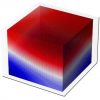The purpose of the course is to present the basic principles of energy behavior of buildings and simulation of the phenomena that affect the interaction of buildings with the environment and with carbon emissions. An analysis of energy flows and transport phenomena in the urban environment will be carried out using models at different urban scales. At the end of the course, postgraduate students will be able to study a building complex – a model for the study of its energy and environmental behavior in an urban environment.
Course contents:
1. Heat and mass transfer in buildings. Conduction – convection – radiation phenomena and shaping of comfort conditions – Interaction of buildings and settlements with the environment
2. Shell thermal behavior and thermal comfort indicators
3. Building and settlement simulation software
4. Heating – cooling loads. Air conditioning I
5. Heating – cooling loads. Air Conditioning II
6. Condensation – Internal Moisture of Masonry
7. Calculations of Condensation Temperature Profiles 8.
Visual Comfort – Natural Lighting – Artificial Lighting
9. Lighting Calculations and Models – Measuring Instruments
10. Acoustic Comfort – Noise Propagation and Reduction in Buildings
11. Applications of Simulation Models at different scales in the urban environment
12. Renewable energy sources in buildings and low-carbon strategies
13. Measuring instruments and field exercises – Presentation of the final research paper
The evaluation of the postgraduate students will be carried out by a work that they will prepare and by an examination (oral or written ) in matters of energy and environmental behavior of the buildings which will be proposed during the deliveries.
2024-03-21
